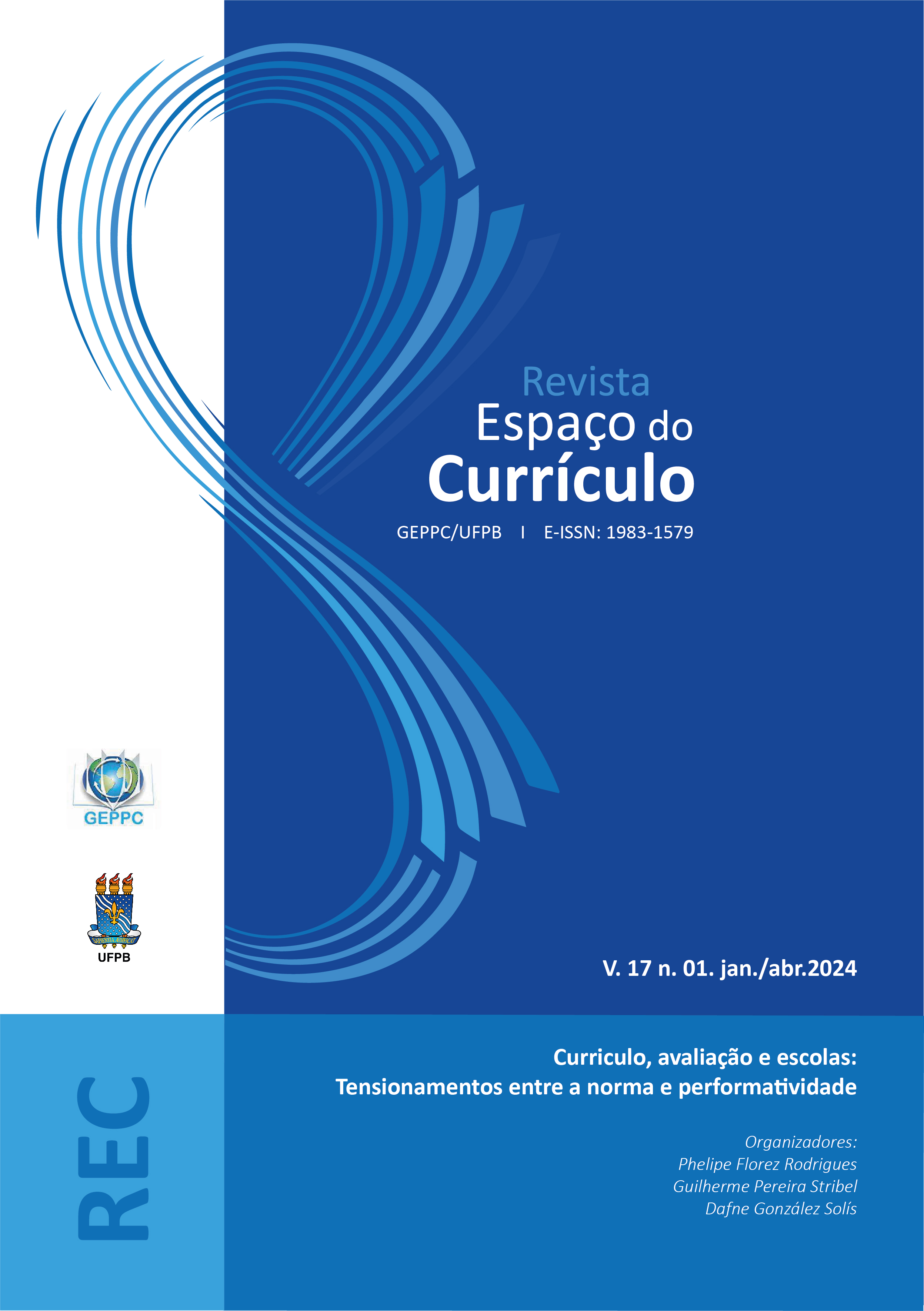PHILOSOPHICAL EDUCATION OF LEARNINGS
(re)construction of teaching knowledge
DOI:
https://doi.org/10.15687/rec.v17i1.67278Keywords:
Learning Evaluation., Philosophical Education., Teacher training., Teaching knowledge.Abstract
This article aims to reflect on the relationship between philosophical education and professional teaching learning. This way, the research was carried out with a qualitative approach, involving bibliographic studies, supported by Benvenutti (2016, 2017), Gallo (2007, 2012), Maturana and Verden-Zöller (2004) and Morin (2000, 2008, 2015), between others. The results indicated a formative stripping and to profane the borders of pathological formations of knowledge and blind intelligences, which are reproduced in the spaces of initial and continued training in teacher formation. In philosophical education for teacher training, conceptual movements of awareness, problematization, investigation and conceptualization were evidenced. It is concluded, therefore, that in philosophical education it is possible to constitute knowledge that is not closed, but allows rhizomatic flights, knowledge that (re)constitutes itself, (re)constructs epistemological, ethical, aesthetic and pedagogical experiences of teacher training.
Downloads
Metrics
References
ALVES, Rubem. Protestantismo e Repressão. São Paulo: Ática, 1982.
BENVENUTTI, Dilva Bertoldi. Avaliação de Aprendizagens: Relação entre formação inicial e práticas adotadas por professoras pedagogas dos anos iniciais da Educação Básica. 2016. 184 f. Tese (Doutorado em educação nas Ciências) – Programa de Pós-Graduação em Educação nas Ciências, Universidade Regional do Noroeste do Estado do Rio Grande do Sul, Ijuí, 2016. Disponível em: https://bibliodigital.unijui.edu.br:8443/xmlui/bitstream/handle/123456789/5015/Dilva%20Bertoldi%20Benvenutti.pdf?sequence=1&isAllowed=y. Acesso em: 08 jul. 2023.
BENVENUTTI, Dilva Bertoldi. Avaliação nos processos de aprendizagem. Editor Prismas, Curitiba, 2017.
BENVENUTTI, Dilva Bertoldi. LAGO, Clenio. A avaliação das aprendizagens: uma perspectiva de não violência. Retratos Da Escola, v. 12, n. 22, 129–146, 2018. DOI: https://doi.org/10.22420/rde.v12i22.795. Disponível em: https://retratosdaescola.emnuvens.com.br/rde/article/view/795. Acesso em: 08 jun. 2023. DOI: https://doi.org/10.22420/rde.v12i22.795
BERTICELLI, Ireno Antônio. A origem normativa da prática educacional na linguagem. Ijuí: Ed. Unijuí , 2004. (Coleção Fronteiras da Educação).
BERBEL, Neusi Aparecida Navas. Dimensão pedagógica. In: BERBEL, N.A.N. et al. Avaliação da aprendizagem no ensino superior – um retrato em cinco dimensões. Londrina. Ed. UEL, 2001.
DELEUZE, Gilles; GUATTARI, Félix. Mil Platô capitalismo e esquizofrenia. Rio de Janeiro: Ed. 34, 1995.
ENGUITA, Mariano Fernandez. A ambigüidade da docência: entre o profissionalismo e a proletarização. Teoria & Educação, Porto Alegre, n.º 4, p. 41 - 61, 1991.
GADAMER, Hans-Georg. Verdade e método II: complemento e índice. 2. ed. Tradução de Enio Paulo Giachini; revisão da tradução de Marcia Sá Cavalcante Schuback, Petrópolis/RJ: Vozes; Bragança Paulista/São Paulo: Ed. Universitária São Francisco, p. 621, 2004.
GALLO, Sílvio. A filosofia e seu ensino: conceito e transversalidade. In: SILVEIRA, Renê José Trentin; GOTO, Roberto (orgs.). Filosofia no Ensino Médio: temas problemas e propostas. São Paulo: Edições Loyola, 2007.
GALLO, Sílvio. Metodologia do ensino de filosofia: uma didática para o ensino médio. Campinas, SP: Papirus, 2012.
GAUTHIER, Clermont. Por uma teoria da Pedagogia: pesquisas contemporâneas sobre o saber docente. Ijuí: Unijuí, 1998.
GLEISER, Marcelo. A ilha do Conhecimento: os limites da Ciência e a busca por sentido. Editora Record Limitada, Rio de Janeiro, 2015.
LANEVE, Cosimo. Per una teoria dela didattica. Brescia: La Scuola, 1993.
LIBÂNEO, José Carlos. Educação: pedagogia e didática. In: PIMENTA, Selma Garrido. Didática e formação de professores. São Paulo: Cortez, 1997.
LUCKESI, Cipriano Carlos. Avaliação da aprendizagem na escola: reelaborando conceitos e criando a prática. 2 ed. Salvador: Malabares Comunicações e eventos, 2005.
MACHADO, Ondina Maria Rodrigues; DEREZENSKY, Ernesto. A violência: sintoma social da época. Belo Horizonte: Scriptum/EBP, 2013, p. 129.
MATURANA, Humberto R. Transdisciplinaridade e Cognição. In: NICOLESCU, Basarab. (org.). Educação e Transdisciplinaridade. Brasília: UNESCO, 2000.
MATURANA, Humberto R.; VERDEN-ZÖLLER, Gerda. Brincar: o caminho desdenhado. In: MATURANA, Humberto R.; VERDEN-ZÖLLER, Gerda. Amar e brincar: fundamentos esquecidos do humano do patriarcado à democracia. São Paulo: Palas Athena, 2004.
MORIN, Edgar. Introdução ao pensamento complexo. Tradução de Eliane Lisboa. 5. ed. São Paulo: Editora Cortez, 2015.
MORIN, Edgar. Os sete saberes necessários à educação do futuro. 2ª ed., São Paulo: Cortez, Brasília, DF: UNESCO, 2000.
MORIN, Edgar. Planetarización y crisis de la humanidad In: Educación. Revista de Educación Moderna para una Sociedad Democrática, n. 152 - enero 2008. México: Cia Impresora y Editora: ANGEMA. 2008.
NÓVOA, António. Firmar a posição como professor, afirmar a profissão docente. Cadernos de pesquisa, São Paulo, v. 47, n. 166, p. 1106-1133, out./dez., 2017. DOI: https://doi.org/10.1590/198053144843. Disponível em: https://www.scielo.br/j/cp/a/WYkPDBFzMzrvnbsbYjmvCbd/?lang=pt. Acesso em: 08 jul. 2023. DOI: https://doi.org/10.1590/198053144843
PIMENTA, Selma Garrido. Saberes pedagógicos e atividades docentes. In: PIMENTA, Selma Garrido (org.). Formação de professores: identidade e saberes da docência. 2. ed. São Paulo: Cortez, 2002.
STRIEDER, Roque; BENVENUTTI, Dilva Bertoldi; BAVARESCO, Paulo Ricardo. Avaliação como oportunidade de aprendizagem: um olhar transdisciplinar. Campinas, SP: Mercado de Letras, 2014.
TARDIF, Maurice. Saberes docentes e formação profissional. 17.ed. Petrópolis, RJ: Vozes, 2014. DOI: https://doi.org/10.5212/OlharProfr.v.17i2.0010
TEDESCO, Anderson Luiz; SCHWENGBER, Ivan Luís; CECCHETTI, Elcio. A formação humana em Nietzsche: entre o “conhecer-se” e o “tornar-se o que se é” no cultivo de si. Revista Educação Em Questão, v. 58 n. 56, 2020. https://doi.org/10.21680/1981-1802.2020v58n56ID21495. Disponível em: https://periodicos.ufrn.br/educacaoemquestao/article/view/21495/13128. Acesso em: 08 jul. 2023. DOI: https://doi.org/10.21680/1981-1802.2020v58n56ID21495
Downloads
Published
How to Cite
Issue
Section
License
Copyright (c) 2023 Curriculum Space Journal

This work is licensed under a Creative Commons Attribution 4.0 International License.
By submitting an article to Curriculum Space Journal (CSJ) and having it approved, the authors agree to assign, without remuneration, the following rights to Curriculum Space Journal: first publication rights and permission for CSJ to redistribute this article. article and its metadata to the indexing and reference services that its editors deem appropriate.
















